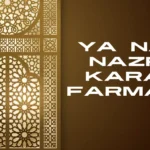Ya Nabi Nazre Karam Farmana” is a deeply moving invocation that encapsulates the essence of devotion and yearning for the mercy of the Prophet Muhammad (PBUH). Through its poetic verses, the lyrics celebrate the Prophet’s unparalleled status, his intercession, and the hope for his merciful glance. Let’s explore each verse of this heartfelt naat, unraveling its meaning and significance.
| Ya Nabi Nazre Karam Farmana Lyrics |
| Allah Ho Allah Ho Lyrics | Malik ul mulk |
| Tajdar e Haram – ho nigaah e karam Lyrics |
| Main Banda E Aasi Hoon Gunahgaar Banda Hoon |
Ya Nabi Nazre Karam Farmana
“O Prophet, cast a merciful glance.”
The opening plea is simple yet profound. It reflects the supplicant’s utmost humility and dependence on the Prophet Muhammad’s (PBUH) mercy. Muslims believe that the Prophet’s intercession is a pathway to Allah’s forgiveness, making this invocation a deeply personal request for his blessings.
Aye Hasnain Ke Nana
“O Grandfather of Hasan and Husayn!”
This verse invokes the familial connection of the Prophet (PBUH) with his beloved grandsons, Hasan and Husayn (RA). By calling upon this sacred relationship, the supplicant seeks to appeal to the Prophet’s compassion. The repetition of “Aye Hasnain ke Nana” emphasizes intimacy, love, and hope.
Zahra Paak Ke Sadqay Humko Taiba Mein Bulwana
“For the sake of Zahra the Pure, call us to Taiba (Madina).”
Here, the supplicant prays for the honor of visiting Madina, the city of the Prophet (PBUH), by invoking the status of his noble daughter, Fatima Zahra (RA). It highlights the eternal bond between the Prophet and his progeny, inspiring love and respect for the family of the Prophet.
Aap Ke Dar Ka Hun Main Bhikari, Aap Hain Mere Daata
“I am a beggar at your door; you are my provider.”
This verse illustrates the ultimate surrender to the Prophet Muhammad (PBUH), portraying the individual as a humble seeker of mercy and blessings. The metaphor of a beggar signifies complete reliance on the Prophet’s generosity, a sentiment that resonates deeply with believers.
Saare Rishte Naato Se Hai Piyara Apna Naata
“Our bond is dearer than all relationships.”
The unique relationship between the Prophet (PBUH) and his followers is described here as unparalleled and eternal. This bond transcends worldly ties, offering a spiritual connection filled with love, faith, and loyalty.
Be Saya Hain Lekin Do Jag Par Hai Aap Ka Saaya
“You are shadowless, yet your influence covers both worlds.”
This line refers to the miraculous nature of the Prophet (PBUH), believed to be without a shadow as a sign of his divine favor. Despite this, his blessings and mercy extend across both worlds—this life and the Hereafter—making his presence timeless and universal.
Arshe Mu’alla Bana Muhalla Deed Ko Rab Ne Bulaya
“The Lord called you to the highest throne for a vision.”
This verse celebrates the Prophet Muhammad’s (PBUH) ascension to the heavens during the Night Journey (Isra and Miraj), where he was honored with a divine audience. It reflects his unmatched status and closeness to Allah.
Saj Gayi Hai Milad Ki Mehfil, Kya Hai Khoob Nazaara
“The Milad gathering is adorned; what a splendid sight!”
The scene of a Milad gathering is described, where believers celebrate the birth of the Prophet (PBUH) with joy and devotion. The collective expression of love and spirituality during such occasions inspires unity and reverence.
Kaif-o-Masti Main Dooba Hai Dekho Aalam Saara
“The whole world is immersed in ecstasy and bliss.”
This verse beautifully captures the universal impact of the Prophet Muhammad’s (PBUH) mercy and teachings. His influence spreads joy, spirituality, and hope, touching every aspect of life.
Nisbat Ka Faizan Hai Dekho, Khadim-e-Ghous-e-Jali Hoon
“Look at the blessings of association; I am a servant of Ghous-e-Jali.”
The supplicant identifies as a devoted follower of great Islamic saints like Ghous-e-Azam, showcasing the honor and blessings derived from being part of such spiritual lineage.
Aap Ki Aal Ke Dar Ka Sag Hoon, Saail Hoon Purana
“I am a humble servant of your household, a long-time supplicant.”
This line reiterates the individual’s devotion to the Prophet’s family, emphasizing humility and loyalty. It is a heartfelt reminder of the importance of staying connected to the Prophet (PBUH) and his descendants.
Ya Nabi Nazre Karam Farmana – Aye Hasnain Ke Nana
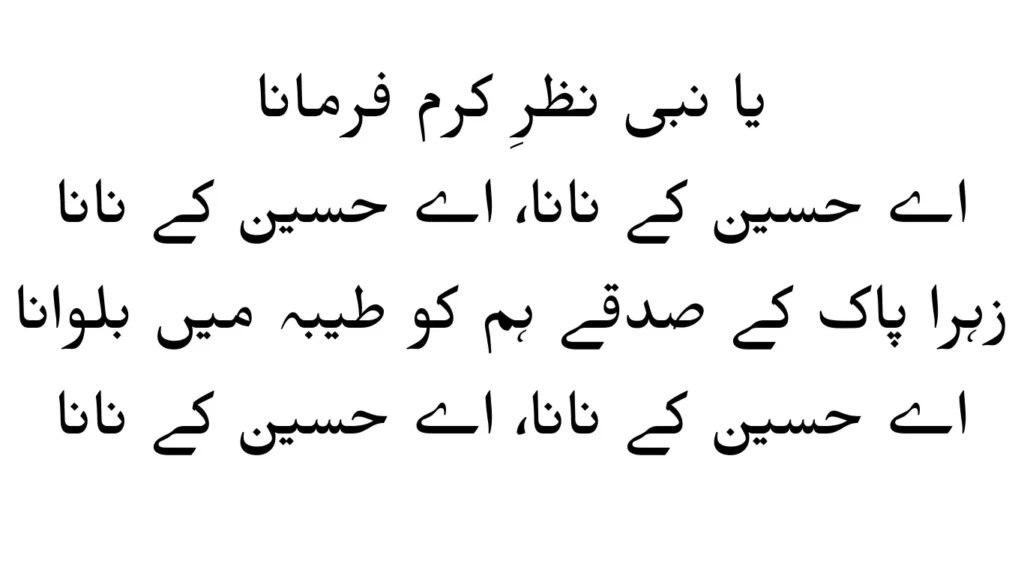
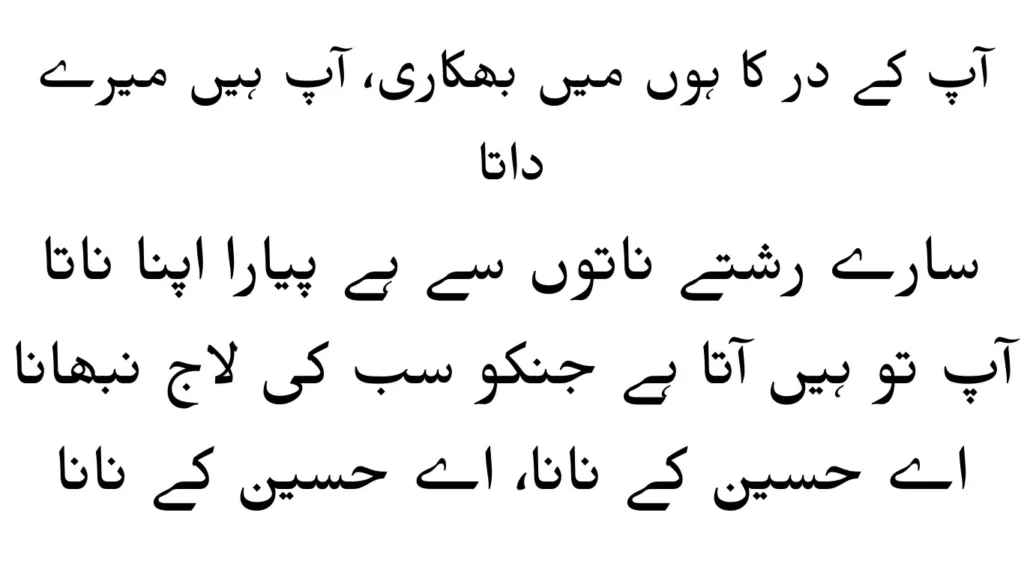
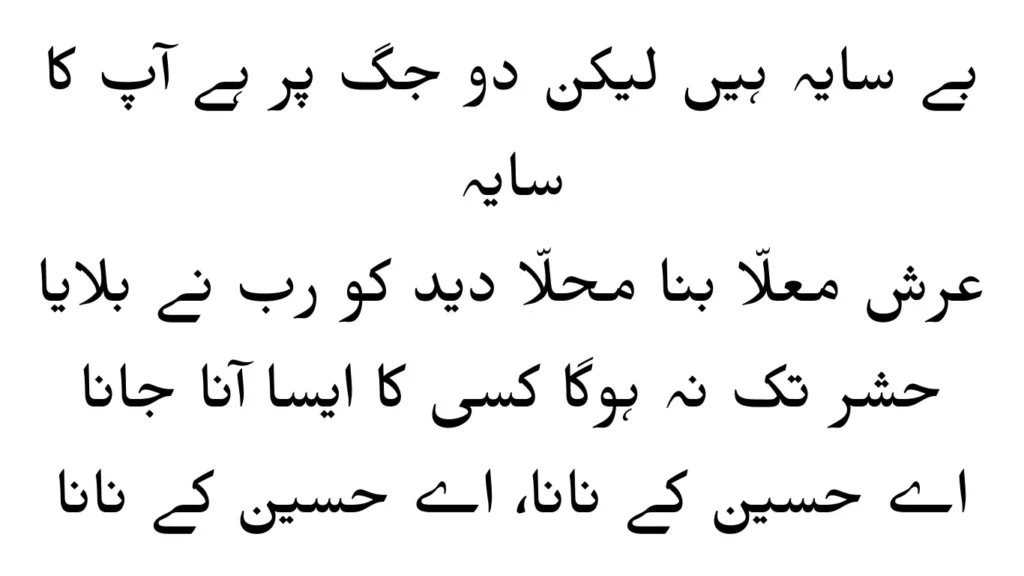
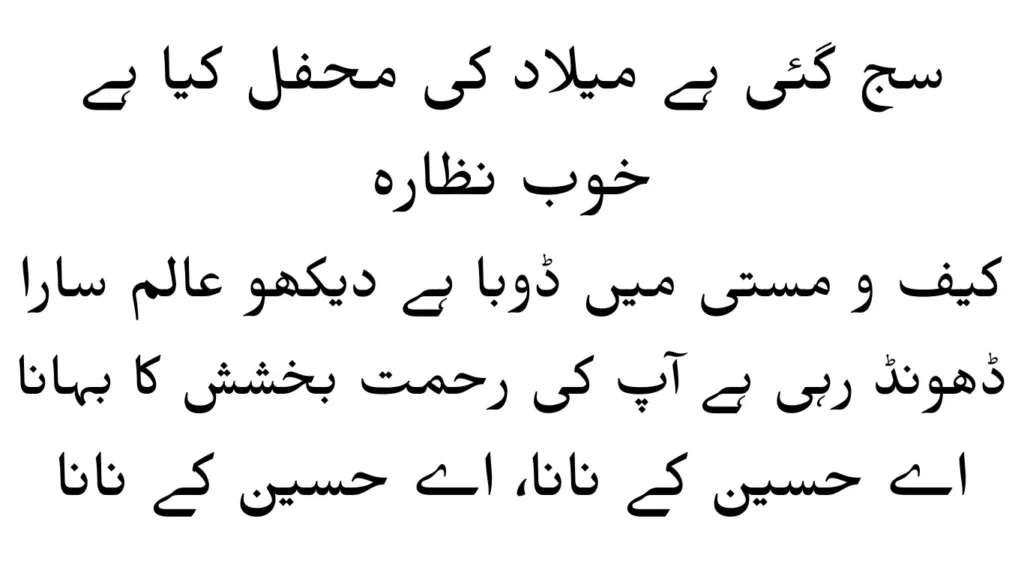
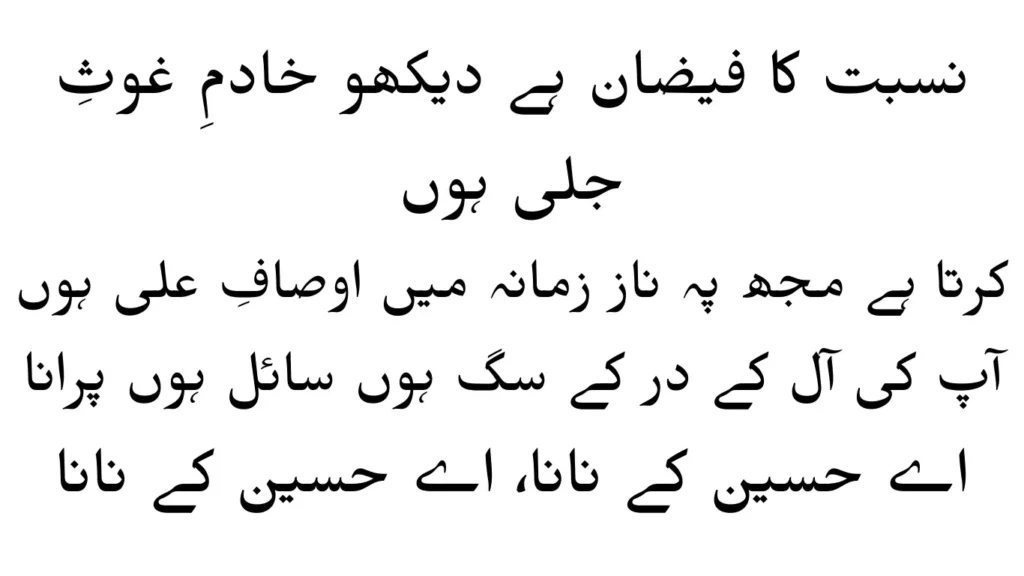
The Message of the Naat: A Call to Devotion
Each verse of “Ya Nabi Nazre Karam Farmana lyrics in urdu” resonates with love, hope, and the desire for spiritual proximity to the Prophet Muhammad (PBUH). The lyrics connect believers to the Prophet’s mercy and intercession, inspiring unwavering faith and devotion.
FAQs:
Ya Nabi Nazre Karam Farmana” translates to “O Prophet, cast a merciful glance.” It is a plea for the Prophet Muhammad’s (PBUH) mercy and blessings.
This phrase highlights the Prophet Muhammad’s (PBUH) connection to his grandsons, Hasan and Husayn (RA), invoking their sacred bond as a means to seek mercy and blessings.
Milad gatherings celebrate the birth of the Prophet Muhammad (PBUH). They serve as occasions for believers to express their love, devotion, and gratitude for his life and teachings.
By analyzing and reflecting on these beautiful verses, we deepen our connection to the Prophet Muhammad (PBUH) and strengthen our faith. This naat is a timeless reminder of the mercy, love, and blessings he brings to our lives.

